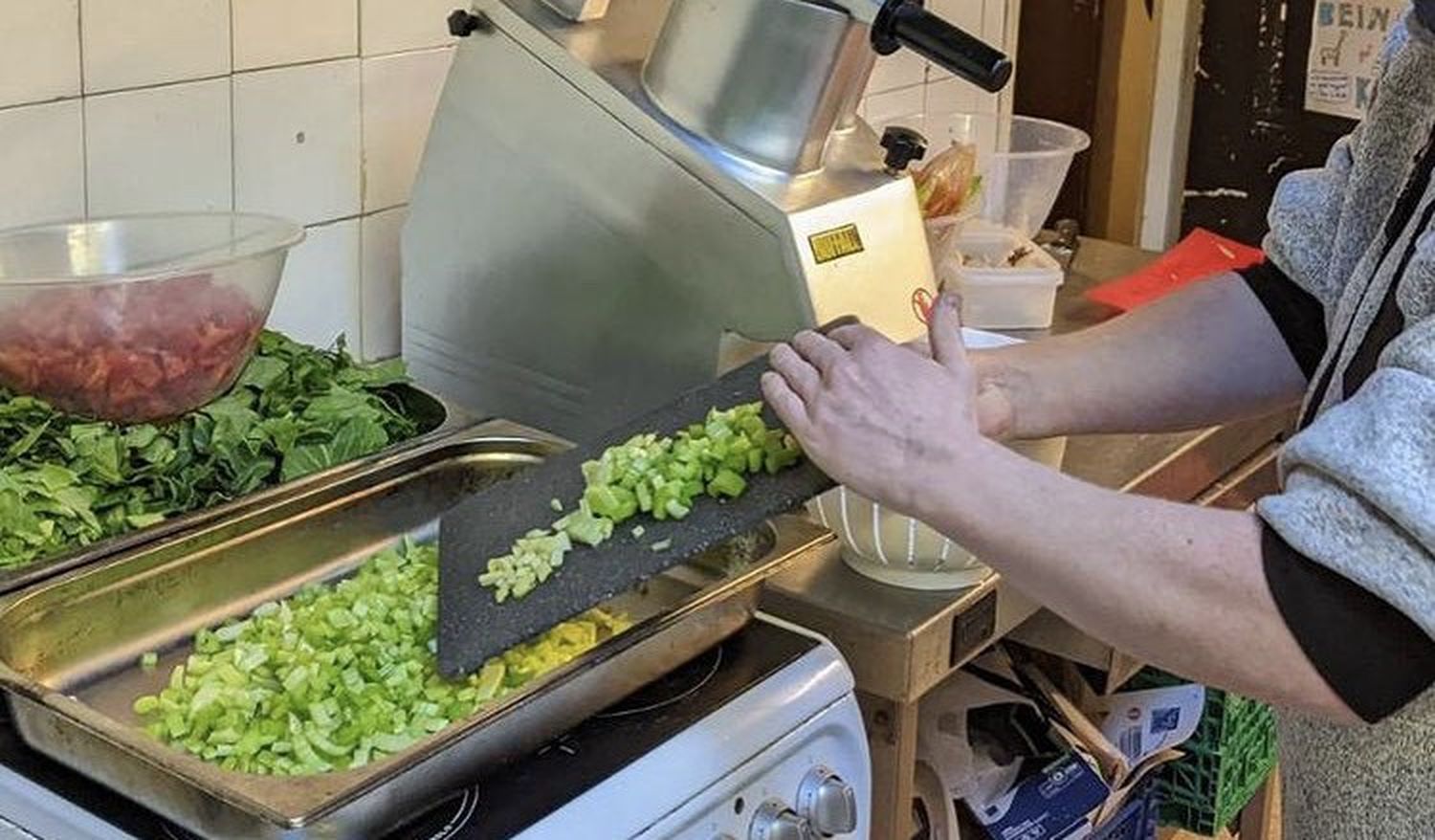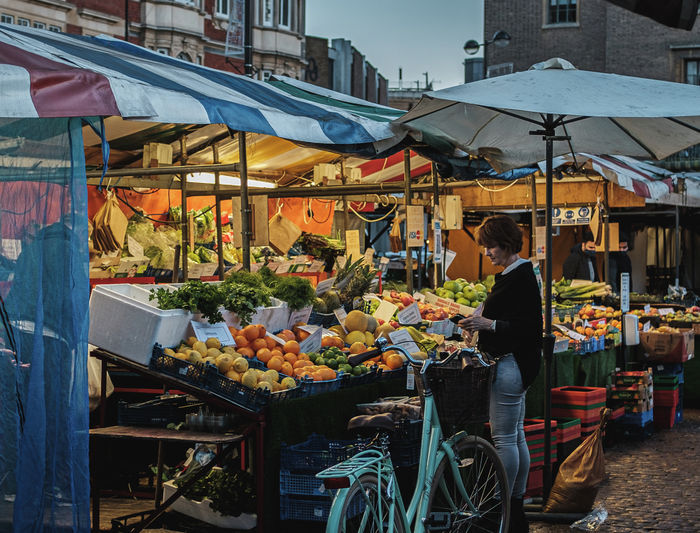As Steinbeck wrote, “happiness does not rise out of one’s roots, nor come floating up, but is rather manufactured.” Perhaps so is community. For the Cambridge Community Kitchen walls were plastered gleefully with posters, listing not rules but what looked like agreed-upon boundaries, ideals, and mutual decisions which served as the brickwork for a culture of respect. Only a two minute walk from my Cambridge accommodation on King Street, this feels like another world.
I stand over six cabbages, rolling towards the edge of a pristine metal countertop. I cut them into 1cm pieces (as specified by the poster which warns me at eye-level) so that those who struggle to chew can still receive the neatly packaged meals, and slice away the bad bits. The knife is blunt and I am acutely aware of my culinary incompetence. Stabbing a Sainsbury’s own brand chicken korma doesn’t exactly teach you any deft. Ten minutes earlier, I had stepped through a narrow doorway, weaved my way through the angry, emotive, yet hopeful miscellanea which littered the entryway, and stopped short at walls branded with slogans: “freedom is a verb”, apparently, and “all hot people move to Bristol”. The second certainly feels true. Maybe I should look into a Master’s programme there.
“With mutual aid, it is the norm to give when you can give, and take when you can’t”
After four hours spent cooking we boxed up the meals and sent them on their way. We made 280 portions of bean and cabbage pasta. It tasted fine — warm and comfortingly bland, hearty, and ever so slightly on the wrong side of cooked. Timing is harder in bulk. In the glow of the setting sun, a volunteer explained that the Cambridge Community Kitchen runs two such sessions a week, alongside organising delivery and cleaning rotas, providing meals for those in need throughout the city. It sprung as a non-hierarchical organisation — proudly not a charity — organically after COVID-19 prevented them from providing their usual open-house meals. Since then, the operation has only grown, never deviating from its core values. The character of a non-charity model is splatted as graffiti onto its walls, either alienating or inspiring.
Having put us in touch with their sister organisation, Erik and I went to raise these questions to “Cambridge Solidarity Fund”. We meet Tetra and Crow in a café of their choosing off Regent Street. It’s far too early for any self-respecting humanities student. Croissant and coffee in hand, we grab a table by the window. “I don’t think I’ve ever been up this early,” I confess. A quick scan of the room makes it dawn upon us that we’re the only students here. The choice of café felt slightly deliberate then. Near enough to the university for us to meet but equally not too near to enter its realm: a neutral space between the “real” Cambridge and the University of Cambridge; between the most deprived parts of the most unequal city in the UK and the institution’s landed, arena-owning, wine-decanting colleges. A middle man between excess and scarcity.
“Educational inequality also runs through the city’s veins, the narrow causeways which border restricted collegiate land”
Tetra, a volunteer, admitted that not being an official charity “is probably a reason people don’t donate”. Yet they argue that “the structures of accountability” of normal charities “are not working”. A binary is placed between donor and recipient in the charity model — with mutual aid, it is the norm to give when you can give, and take when you can’t. Furthermore, were either project given charity status, they would fall under the Lobbying Act, unable to make any party-political statements in the run up to an election. Their organisation can therefore speak freely on political issues. Tetra, over the noise of a bustling cafe, laughed that admittedly, obtaining charity status would also be “a massive ball-ache”. Through their humour, they made an important point: the complicated process involved makes community-oriented, small scale work incredibly difficult.
“Cambridge Mutual Aid told us that they have given grants to students in need”
Such community work is organised, as Crow explained, by just about three people “sitting at home on [their] laptops” . Their organisation, small as it may be, is life-changing for many. Giving out monthly grants of £50, Cambridge Solidarity Fund operates on a no-questions-asked policy. “We don’t want to know” about the reasons people apply, Tetra told us. They would rather trust people. This is where they differ from most charities. Those who sent in anonymous thank-yous nevertheless reveal the importance of such work, as well as the dire situation of poverty in Cambridge. One recipient wrote that “it got [them] food and [they] could pay some rent”, and another that “the £50 helped [them] put food in the fridge and buy presents for Xmas”. In a city where university students are purportedly supported to the highest degree, one anonymous beneficiary wrote that “the fund really helped [them] be able to support my eldest son with getting him some revision cards and stationery to help prepare for his GCSEs”. Educational inequality also runs through the city’s veins, the narrow causeways which border restricted collegiate land.
With neither organisation receiving any money, or even leftover food, from the University, the old town/gown aphorism is made starkly clear. Topographic divisions, marked by high stone walls (or perhaps red brick) are emblematic of not only a division in wealth but a barrier to help: in 2019, a homeless woman gave birth under the stoney gaze of Trinity College, her twins being born in its austere and unforgiving entrance. The University of Cambridge, I suppose, would argue that it owes nothing, technically, to such organisations: that it looks after its own and the city theirs. However, Cambridge University does not look after its own. In fact, Cambridge Solidarity Fund told us that they have given grants to students in need. Of course, they have never asked outright, but when emailed from a Cambridge University CRSid, and asked to meet at a college gate, the situation is made abundantly clear. Perversely, money is flowing the wrong way, up a steep slope — from the community into the University. “We do get a donation from a bursar,” said Crow. Later xe clarified. Xe meant that the bursar herself gave £20 per month, not her college.
“If we’re talking about big messages”, Tetra left us with, they want students to understand that we live “in a city”. For all the Cambridge bubble jokes, “it’s not actually funny”.
Hands frozen from cabbage chopping, I walk back home down King Street. The wisteria hangs lavishly from the tall stone frontiers. Rose coloured glasses half-off, the lilac border-dressing seems less appealing. I still stop to take a picture, and I guiltily post it to my Instagram story. Walking into Sidney, I slip through the beautiful checkpoint.


